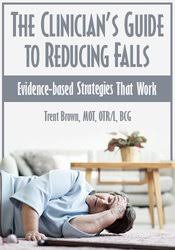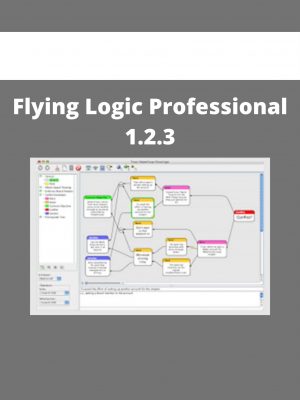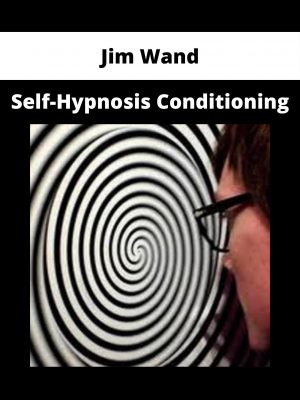Trent Brown – The Clinician’s Guide to Reducing Falls, Evidence-Based Strategies that Work
$200 Original price was: $200.$75Current price is: $75.
Shopping Instructions:
- DISCOUNT 15% : SHOP15
- Product Delivery: Within 1 – 12 hours after purchase.
In this lab-intensive recording, learn and practice the evidence-based tools I use to help prevent falls. Feel confident and comfortable using these proven strategies that immediately carry over into your clinical setting.
Trent Brown – The Clinician’s Guide to Reducing Falls, Evidence-Based Strategies that Work
Reduce Falls and Increase:
- Functional and occupational performance and participation
- Visual processing and strategies during dynamic movement and ambulation
- Safety with gait, functional mobility, transfers, and sit-stand
- Patient confidence with mobility in the home and community
As a clinician who has worked in skilled nursing, home health, acute, and transitional care, I’ve seen and treated too many patients who experience falls. In the past, I focused too much of my attention on strengthening the low extremity or solely on home modification, which resulted in seeing minimal gains. What was I missing? There had to be a better way to treat this population. Finally, I discovered that by examining the myriad causes to falls – psychological, physiological, visual, and neuromuscular – I could effectively treat my patients by improving functional and occupational performance and giving them confidence with mobility in their home and community.
In this lab-intensive recording, learn and practice the evidence-based tools I use to help prevent falls. Feel confident and comfortable using these proven strategies that immediately carry over into your clinical setting.
- List the major contributors to falls and the most common environments where falls occur for the adult and geriatric population
- Describe the role that medications play in falls, and what steps can be taken to reduce the likelihood of medication-related falls
- Restate the role of clinicians in fall prevention in various rehab facilities, in the home, and in the community at large
- Identify the common principles in a fall reduction program that lead to the best outcomes
- Develop a practical understanding of learned exercises and assessments during labs to ensure immediate carryover into clinical settings
- Apply documentation strategies and language based on information to justify skilled clinical services and reimbursement to all payer sources
THE COST OF FALLS
- Frequency of falls – a breakdown in the US
- Results of falls
- Cost and future projections
- Environments where falls occur
CAUSES OF FALLS AND WAYS TO REDUCE THEM
- Specific causes
- Medication
- Ageism
- Diagnosis
- Contracture
- Weakness
- Compensatory gait patterns
- Common associations leading to falls
- Fear of falling (stiffening strategy)
- Genomic hypovitaminosis
- Gender
- UE weakness
- Visual space relation and fixation duration
- Soleustretch and Visual Stance demonstration
- LAB
- PNF functional strengthening techniques (CR vs HR vs CRAC)
- GRAC Rowing (Modified D1, D2)
- Gastroclock with CRAC technique
- LAB
- Medication and mechanism
- Type I iliopsoas contracture and anterior pelvic tilt vs. posterior pelvic tilt
- Male vs. female
- Lengthen and shorten demonstration
- LAB
CLINICAL AND EDUCATIONAL ROLE IN REDUCING FALLS
- Education
- Sleep, adaptive equipment, home environment
- Fall reduction in the home
- Otago and other “fall reduction” programs
- 4-Test Balance Scale (LAB)
- Chair Stand Test
Would you like to receive Trent Brown – The Clinician’s Guide to Reducing Falls, Evidence-Based Strategies that Work ?
BEST PRACTICE: ASSESSMENTS, ACTIVITIES, AND EXERCISES
- Fall risk evaluations
- Functional reach (FRT), TUG, Fall Algorithm
- LAB
- Hip/frontal plane stabilizers
- Reducing circumduction, shuffle, or Trendelenburg gait
- Trochanter Tension
- LAB
- Hip mobilizers
- Seated and standing mobilization technique
- Dynamic PNF chops
- Quad sit-up (LAB)
- Log roll
- Determinants of gait
- Exercise/activity dose and frequency
DOCUMENTATION AND CASE STUDY
- 5 platforms of successful documentation
- Documentation examples
- Case study
Related products
NLP & Hypnosis
NLP & Hypnosis
NLP & Hypnosis
NLP & Hypnosis
NLP & Hypnosis
NLP & Hypnosis
NLP & Hypnosis
NLP & Hypnosis
Joseph Cohen – The SelfHacked Secrets To Understanding Why You Are Sick And How To Get Well












